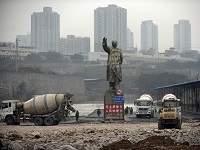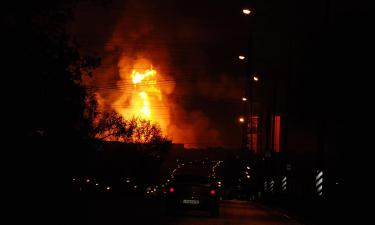Chinese miracle about to burst like a bubble?
The bright Future of China is being predictably pushed back indefinitely. The GDP growth has slowed down. In the first quarter of 2013, the growth made up 7.7 percent, while China closed last year with the index 7.9 percent. Despite the fact that this growth may seem low for China, the consequences of the reduction already affect the world.

For comparison, Russia's GDP growth last year made up 4.3 percent. However, the situation in our country (as well as in other countries) differs a lot from the state of affairs in China. The processes similar to those that are now taking place in China, took place in Russia during the 1930s. The mass exodus of people from villages provides industrial and urban development. Production is booming because of cheap labor force. This, in turn, increases the need of the state in raw materials. Given the scale of the Chinese industrialization, it has significantly increased the demand on raw materials in the world.
Until the last decade, China's GDP growth exceeded 10 percent a year. The phenomenon led to the appearance of the Chinese economic miracle and a future superpower - a world leader. At the very least, science fiction writers love this scenario. However, objectively it was clear that the economic growth can not go on forever through industrialization. It looks like the setback period has arrived. Globally, there is nothing wrong with that: the process is quite natural and logical. Developed countries have experienced it at one time or another, and this experience is yet to come for developing states. If we take special cases, financial turmoil is in store for the whole world.
Actually, the turmoil has already begun. Monday showed a record low price on gold on stock exchanges. The last time, when gold fell that low, was about 30 years ago. One of the reasons was the slowing GDP growth in China: the market reacts to such things quickly and violently.
China's foreign trade partners, such as Australia, Latin America and Africa, will suffer enormous losses. Their economy is based on China's GDP growth of not less than nine percent a year, the co-head of the Asian Economic Research of HSBC, Frederic Neumann, told The Financial Times.
The process will affect both domestic and international markets. The Chinese economy is used to industrialization. Now the economy will have to face new challenges, and only time will show to which extent the Chinese economy can be global.
For example, Chinese builders and developers adjusted themselves to active sintering processes. There are tens of thousands of urban houses built in the country every year. The buildings are designed for the rapid growth of the urban population. In Shanghai alone, there were about 240 million square meters of housing built during the past decade. Real estate prices rose 3.6 times. Many other projects are being developed too. The new houses, in the first place, meet the needs of the Chinese in the roof over their heads - quality does not come as a priority. Houses are built close to each other, good quality materials are rarely used, apartments are extremely small by European standards. However, a few years ago, such housing was in great demand. Chinese developers say that it was quite possible to sell 60 houses in three hours during their golden age - the mid-2000s , The Vedomosti reports. Apartments were literally snapped up like hotcakes, although, perhaps, it takes longer time for cakes to sell. One should bear in mind the fact that the official Chinese ideology denies private property, so apartments are not available for sale - they become available for long-term rent for 70 years. The price of the rent is equal to the price, at which one may become a full-fledged owner of an apartment in other countries of the world.
This time goes down in history slowly but surely. The Chinese have noticed that the skyrocketing revenue growth in the past concealed enormous debts, corruption and environmental pollution. Drawbacks began to dominate pluses. The Chinese economy has started the process of correction.
Anastasia Garina
Pravda.Ru
Subscribe to Pravda.Ru Telegram channel, Facebook, RSS!



